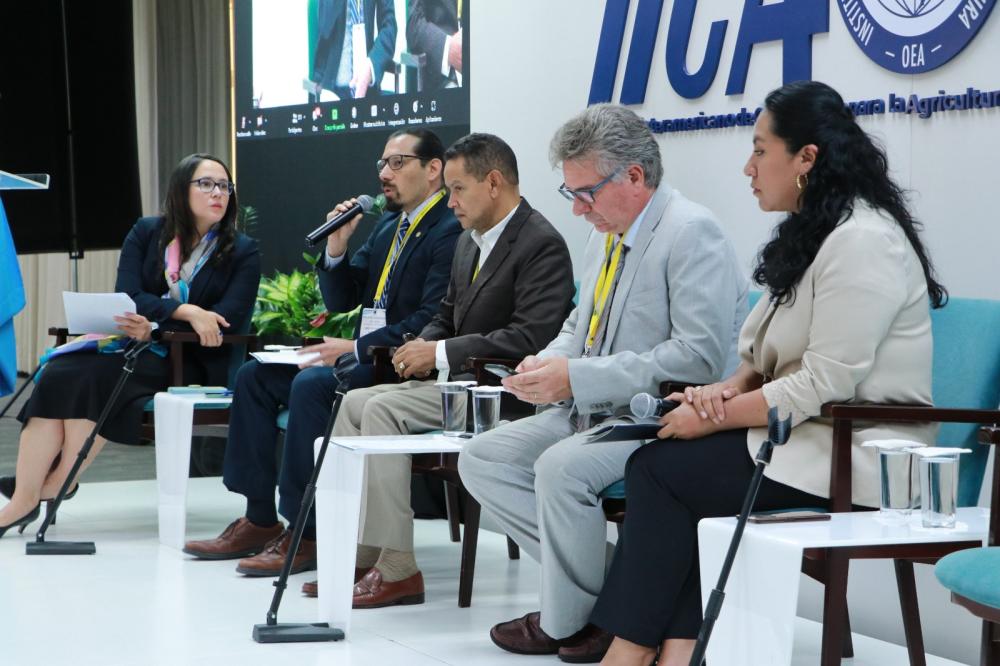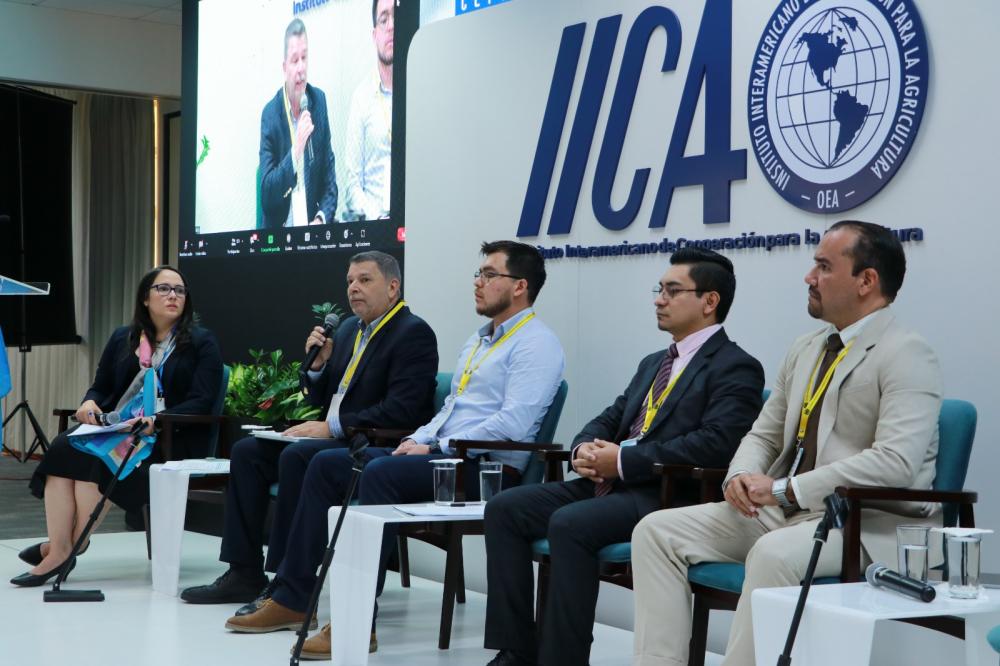The fourth edition of the Regional Water Dialogues in Latin America and the Caribbean combines high-level ministerial discussions with spaces for sharing successful experiences and lessons learned in water conservation and management.

San José, March 13, 2024 (IICA) – Latin American and Caribbean countries detailed the challenges they face in terms of availability and access to water in the context of the climate crisis, and highlighted the most recent advances in public policies on this issue.
The fourth edition of the Regional Water Dialogues in Latin America and the Caribbean, organized by the Economic Commission for Latin America and the Caribbean (ECLAC) and IICA at the Headquarters of the hemispheric agricultural development agency in San José, Costa Rica, combines high-level ministerial discussions with spaces for sharing successful experiences and lessons learned in water conservation and management.
The event is being held in a hybrid¾in-person and virtual¾format. The participants include ministers, deputy ministers and other high-level government officials, representatives of international agencies and members of the private sector, academia and civil society.
Through these Dialogues, Latin America and the Caribbean aim to reach agreement on a joint message to be presented to the World Water Forum in Bali, Indonesia next May, whose theme will be “Water for Shared Prosperity.”
The session on Water Security and Climate Resilience addressed the contributions and experiences of different countries within the framework of the Regional Network and Observatory for Water Sustainability (ROSA), set up by ECLAC in 2023 to create new partnerships and strengthen member countries’ water management capacities in a context of climate change and budgetary constraints.
The presentations on national experiences were given by Jaime Luis Carrera, Deputy Minister of Water of Guatemala; René Mateo de los Santos, Deputy Minister of Soils and Water of the Dominican Republic; Gerardo Amarilla, Deputy Minister of the Environment of Uruguay; and Marissa Castro Magnani, General Director of Boundaries, Borders and International Transboundary Waters of the Ministry of Foreign Affairs of Bolivia.
The moderator was Silvia Saravia, the Economic Affairs Officer in charge of water issues at ECLAC.
There was also a panel discussion on lessons and initiatives with officials from public institutions involved in water management in Costa Rica, Mexico, El Salvador and Nicaragua. The session ended with a debate on data and evidence-based policies with water and sanitation policy experts from CAF-Development Bank of Latin America and the Caribbean, the International Development Bank (IDB) and ECLAC.
Carrera said that one of Guatemala’s biggest water management challenges is the interinstitutional coordination of different projects. “We are lobbying for the creation of an interinstitutional cabinet with a comprehensive vision of water issues that would enable us to harmonize all projects in order to ensure coordinated management of the resource,” he explained. He mentioned that in the Motagua River basin there are more than 60 uncoordinated initiatives, a situation that the authorities are endeavoring to correct.
In the Dominican Republic, a panel of experts was created eight years ago to conduct an assessment of the water situation since, although the country has abundant rainfall, there are sectors of the population without availability and access, De los Santos explained.
“We have problems. As much as 75% of water goes to irrigation, and the efficiency of those operations is put at only 25%. In our drinking water and sanitation systems, 50% of the water is wasted. And although 87% of the population has access to drinking water, only 26% has access to sufficient good-quality water at all times. The country’s working-class neighborhoods receive drinking water only once, twice or three times per week,” the Dominican official pointed out.
De los Santos mentioned that the Dominican Republic had just completed construction of one of the largest water storage reservoirs in the Caribbean, with a capacity of 250 million cubic meters, and the plan is to further increase the country’s storage capacity by at least 20%. “This will require an investment of 8.5 billion dollars,” he acknowledged.

Making a right a reality
Amarilla described the actions his country took to address the serious water crisis that Montevideo experienced in 2023. “We all know that access to water is a fundamental human right guaranteed in national constitutions and other instruments, but unless practical actions are taken to realize it, it remains an empty promise,” Amarilla observed.
The Uruguayan Deputy Minister of the Environment emphasized the importance of not only talking about water in times of drought, but of continuing to do so when rain is plentiful: “The most important thing is to educate society so that people realize that water is a scarce resource. This year in Montevideo consumption dropped, because people showed greater awareness, after last year’s scare.”
Castro Magnani described the initiatives being implemented under the ROSA project in Bolivia, and explained that her country “is a geographical space in the heart of South America, which is the source of the Amazon and del Plata watersheds and whose distribution of water is quite heterogeneous.”
She mentioned that strengthening water governance is a priority in Bolivia, through the incorporation of local populations, municipalities and communities, who know the most about the environmental and social balances that are necessary in each place.
More information:
Institutional Communication Division.
comunicacion.institucional@iica.int










